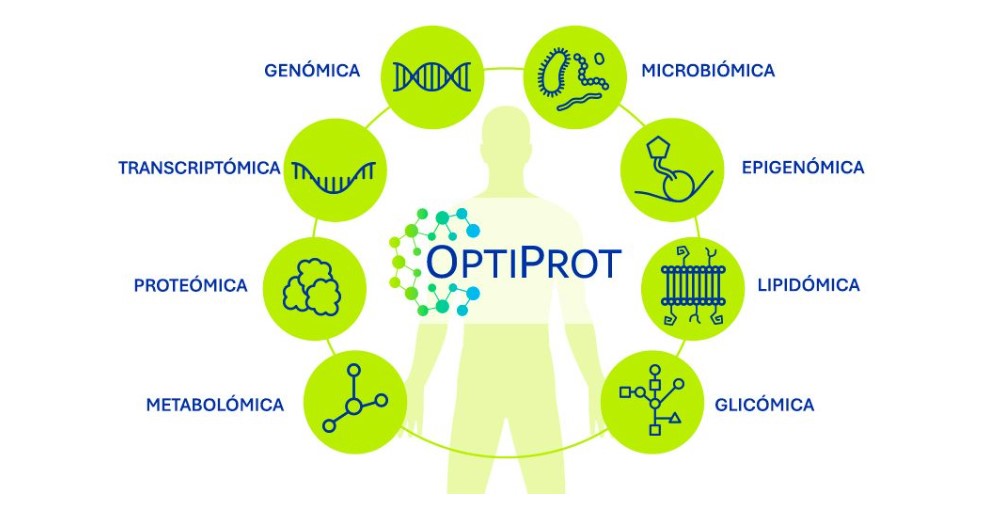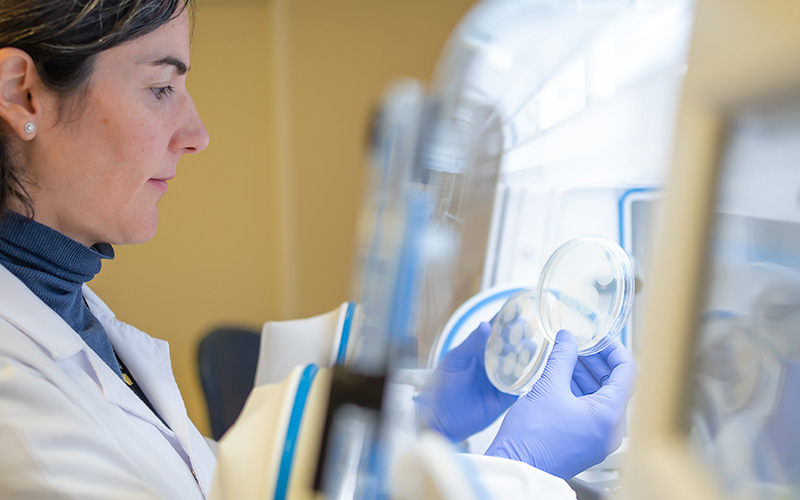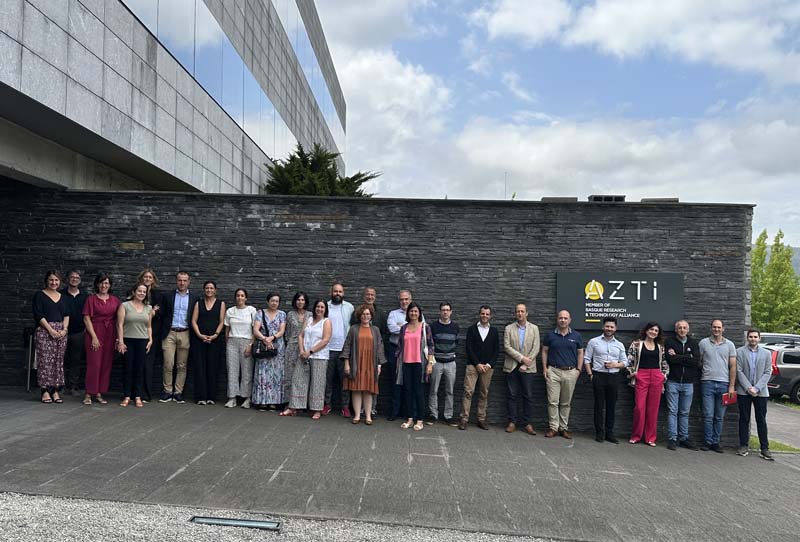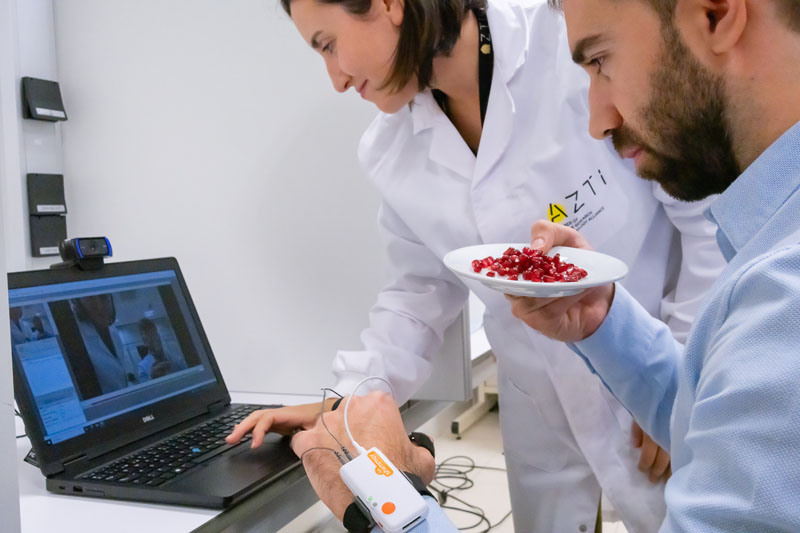Precision nutrition for breast cancer survivors through molecular tools
Últimas noticias
Savour and sustainability: insects in gastronomy
Catching fish living at depths of more than 200 meters may have climatic consequences
The future of marine resources and its impact on food security
MERCEDES CARO BURGOS, Food and Health researcher
Índice de contenidos
Nutritional counseling in cancer
Following a healthy diet provides health benefits, which has led to a recent increase in the demand for nutritional counseling by cancer patients. In oncology, moreover, nutritional monitoring allows patients to actively participate in their treatment and care.
However, nutritional support does not usually accompany oncological therapies, except in cases of malnutrition or evidence of nutritional risk. The main reason is that there is currently a lack of scientific studies evaluating the benefits of certain nutrients or diets in cancer treatment.
In terms of survival phase and long-term outcomes, it is well known that people who survive cancer have an increased risk of other chronic diseases, such as diabetes and cardiovascular disease, and risk of recurrence and second malignancies (formation of new tumors). Worldwide, cancer associations indicate that a healthy and balanced diet can prevent or at least reduce the severity of many of these chronic diseases, but the level of evidence for nutritional improvement interventions is low because most recommendations are based on observational studies with limited samples and observation periods. Therefore, there is an urgent need for dietary interventions to provide an in-depth understanding of the effect of dietary recommendations on the metabolic status of cancer patients.
Novel nutritional intervention
In 2021, AZTI, together with Onkologikoa, initiated a clinical trial driven by a team of oncologists, nurses, nutritionists and researchers and funded by the Spanish Association Against Cancer, which aims to improve the well-being of cancer survivors by generating a new approach to personalized nutritional intervention.
For this purpose, a randomized, controlled study was proposed, considering the best scientific practices and clinical standards for its design. The intervention is based on the performance of multiple omic analyses to obtain the molecular characteristics of each participant and, based on them, to propose a personalized diet to the participants of the intervention group, while the participants of the control group follow a healthy diet based on the Mediterranean diet.
Erythrocyte membrane lipid profile analyses are performed, as well as nutrigenetic analyses, which provide the basis for diet personalization. Microbiota and epigenetic analyses are also performed and will be used to better understand the molecular and metabolic impact of a personalized diet compared to a general healthy diet.
From clinical trial to opportunity for the development of new products and services
In recent years, personalized medicine (based on the molecular characteristics of patients) has been increasingly used in the field of cancer, especially to advise on the optimal choice of treatment for breast cancer. The same concept can be extrapolated to the field of nutrition in its application to cancer treatment, giving rise to the personalized nutrition approach that can provide information on the specific nutritional needs of cancer patients based on their molecular characteristics. Taking into account the current demand by cancer patients for more personalized nutritional recommendations, as well as the great advances in recent years of omics tools applied to nutrition, one could think of a line of research with high clinical projection, considering a tool applicable to different types of cancers or even transferable so that it can be available to the public at an affordable price.
It may also be an opportunity for diagnostic companies, nutrition service companies, hospitals and catering services for the provision of more efficient and customized solutions. Considering the metabolic factors studied in this project, the food and pharmaceutical industries could also benefit from the development of more targeted food or nutraceutical products (e.g. nutrients, lipids, vitamins, minerals or even probiotics for gut health).
In addition, the advance of the molecular diagnostics market now involves other market sectors, such as ICT (Information and Communication Technologies) and Artificial Intelligence. The personalization of treatments involves the integration of different clinical data, nutritional and sensory needs of the individual, exercise requirements, vital signs monitoring, etc. to generate tools (App type) that allow the individual to monitor their state of health.
In summary, this study and its results have the potential to provide a solution to a major unmet patient need, improving the long-term quality of life of cancer survivors, and to attract the interest of other stakeholders (industries and technologies) that can create new collaborations and economic opportunities.

In-depth study of the methodologies used
Erythrocyte lipidomics studies the lipid composition of the erythrocyte membrane and its functions in the cellular response and thus in the organism as a whole. The healthy membrane has a characteristic fatty acid composition and contains both endogenous fatty acids (from metabolism) and essential fatty acids (only available from the diet). If certain fatty acids are outside their optimal ranges, they reflect molecular imbalances that can be reversed by dietary changes. Preliminary studies demonstrate the important role of fats not only in cancer prevention, but also in disease progression. Therefore, the membrane lipid profile has great potential as a biomarker for clinical use in cancer.
Other molecular tools such as nutrigenetics are proving to be of great interest in understanding phenomena related to the quality of life of cancer survivors. Nutrigenetics is a branch of nutritional genomics that studies how different genetic variants in individuals influence nutrient metabolism, diet and associated diseases. The goal of nutrigenetics is to provide individuals with personalized disease prevention advice based on personalized genomics. Although there are numerous studies demonstrating the importance of the study of nutrigenetics to improve the nutritional and metabolic status of patients, especially associated with obesity and metabolic syndrome, and the role of nutrigenetics in the pathogenesis of cancer, we do not have many publications in relation to breast cancer survivors.
References:
Keaver L, Houlihan C, O’Callaghan N, LaVertu AE, Ding X, Zhang FF. Evidence-based nutrition guidelines for cancer survivors in Europe: a call for action. Eur J Clin Nutr. 2022 Jun;76(6):819-826. doi: 10.1038/s41430-021-01036-8
Ferreri C, Chatgilialoglu C. Membrane lipidomics for personalized health2015. p. p.
Amezaga J, Arranz S, Urruticoechea A, Ugartemendia G, Larraioz A, Louka M, et al. Altered Red Blood Cell Membrane Fatty Acid Profile in Cancer Patients. Nutrients. 2018;10(12).
Ramos-Lopez O, Milagro FI, Allayee H, Chmurzynska A, Choi MS, Curi R, et al. Guide for Current Nutrigenetic, Nutrigenomic, and Nutriepigenetic Approaches for Precision Nutrition Involving the Prevention and Management of Chronic Diseases Associated with Obesity. J Nutrigenet Nutrigenomics. 2017;10(1-2):43-62.
San-Cristobal R, Navas-Carretero S, Livingstone KM, Celis-Morales C, Macready AL, Fallaize R, et al. Mediterranean Diet Adherence and Genetic Background Roles within a Web-Based Nutritional Intervention: The Food4Me Study. Nutrients. 2017;9(10).
Elsamanoudy AZ, Neamat-Allah MAM, Mohammad FAH, Hassanien M, Nada HA. The role of nutrition related genes and nutrigenetics in understanding the pathogenesis of cancer. Journal of Microscopy and Ultrastructure. 2016;4(3):115-22.
Theodoratou E, Timofeeva M, Li X, Meng X, Ioannidis JPA. Nature, Nurture, and Cancer Risks: Genetic and Nutritional Contributions to Cancer. Annual review of nutrition. 2017;37:293-320.







